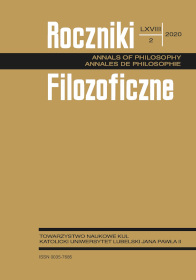
We kindly inform you that, as long as the subject affiliation of our 300.000+ articles is in progress, you might get unsufficient or no results on your third level or second level search. In this case, please broaden your search criteria.


Descartes’s epistemology is rooted in his profound interest in and respect for what might be called intellectual experience, especially lucid intellectual experience. (Lucid intellectual experience is my term for what Descartes calls perceiving clearly and distinctly.) This interest, it seems to me, was shared by Descartes’s rationalist successors Spinoza and Leibniz. In the first part of this paper, I locate the phenomenon of lucid intellectual experience, focusing on Descartes and Spinoza. I try to show if we do not give enough attention to the character of such experience, we risk losing touch with a central motivation behind their respective epistemologies. In the second part of the paper, I consider intellectual experience in the context of skeptical doubt, particularly radical doubt. Although Descartes and Spinoza are often taken to be opposed here, I think they share more than is commonly appreciated.
More...
The topic of the paper is the notion of intuition in Descartes’ philosophy and its epistemic functions. Descartes introduces his notion of intuition in the context of a description of his method and process of knowing and doing science. Intuition is a significant component of this process. I intend to show that the main epistemic functions of intuition in Descartes’ philosophy are differentiated. Intuition is essential not only in the context of justification (the Cartesian synthetic method of proof) but also and especially in the context of discovery (the Cartesian analytic method of discovery). It plays not only a role in the foundation of the cogito but also on different stages of constructing the system of knowledge. Intuition has important functions in grasping simple natures, forming primary concepts, comprehending complex natures, forming primary propositions (including primary principles), and capturing relationships between them and building deductive reasoning (the role of intuition in deduction). Hence, intuition is the foundation for all primary stages of producing knowledge. It is active and important element of pure thinking (a priori) in human knowledge, and science. It fulfils these functions due to its specific epistemic properties. I also argue that intuition is not an autonomous and complete type of knowledge. Nor is it an intuitive thesis, but rather the basis of a justification for theses (including the cogito).
More...
In this article, I discuss the epistemic role that Descartes believed was played in knowledge construction by current clear and distinct perceptions (the ideas or propositions which appear most evident to us when we are attending to them). In recent literature, we can find two interpretations about the epistemic status and function of current clear and distinct perceptions in Descartes’ epistemology. The first may be called the psychological, the second normative. The latter states that current clear and distinct perceptions are utterly immune to all doubt, even before God’s existence is proven and the general rule of truth is established. Thus, their certainty is for Descartes not merely psychological, but normative. I endorse the normative interpretation for a number of what I believe to be cogent reasons. However, there are also some difficulties with it. Therefore, after presenting positive arguments for the interpretation (sections I–IV) I discuss the difficulties of textual and substantive nature that the normative interpretation needs to address if it is to be upheld (sections V–VI).
More...
We offer a novel interpretation of the argumentative role that Meditation IV plays within the whole of the Meditations. This new interpretation clarifies several otherwise head-scratching claims that Descartes makes about Meditation IV, and it fully exonerates the Fourth Meditation from either raising or exacerbating Descartes’ circularity problems.
More...
This paper discusses the epistemic status of bodily sensations—especially the sensations of pain, hunger and thirst—in the second part of Descartes’ Sixth Meditation. It is argued that this part is an integral component of Descartes overall purely epistemological project in the Meditations. Surprisingly perhaps, in contrast with his standardly taken infallible, internalist and foundationalist position, Descartes adopts a fallibilist, externalist and reliabilist position as regards the knowledge and beliefs based on bodily sensations. The argument for this conclusion is justified by an analysis of both the criterion of nature’s teachings and the concept of true errors of nature in terms of Wilfrid Sellars’ distinction between the logical space of reasons and the empirical space of causes.
More...
Many contemporary social epistemologists take themselves to be combatting an individualist approach to knowledge typified by Descartes. Although I agree that Descartes presents an individualist picture of scientific knowledge, he does allow some practical roles for reliance on the testimony and beliefs of others. More importantly, however, his reasons for committing to individualism raise important issues for social epistemology, particularly about how reliance on mere testimony can propagate prejudices and inhibit genuine understanding. The implications of his views are worked out more fully by some of his immediate successors; I examine how François Poulain de la Barre, and (briefly) Mary Astell analyze the social conditions for epistemic agency in a Cartesian vein.
More...
In this article I endeavour to present the axis of the dispute between Hobbes and Descartes on the ground of Meditation, and its most important moments. I focus primarily on the analysis of the most important accusations made by Hobbes and the reconstruction of some of his views, which at the time could only be found in The Elements of Law, Nature, and Politics. This work was the first major and coherent attempt to speak out on cognitive-theory and social issues; I strive to defend the thesis that understanding the content of Objections requires knowledge of this work. The mature form of the work shows that the Englishman already had his views well thought-out and could feel quite confident in formulating from their perspective critical remarks on Descartes’s philosophy, to which, it seems, he may have owed quite a lot.
More...
This article focuses on the relationship between the conceptions of personal identity presented by Descartes and by Locke. Contrary to common readings, I claim that the difference between them cannot be reduced to a simple contrast between rational substantialism and genetic empiricism. Locke does not resign from the substantialist position but delimits the two spheres: natural cognition with its foundation in experience and philosophical speculations, in which he tries to present a rational interpretation of religious dogmas which is consistent with his epistemological programme. Locke’s criticism is directed against the Cartesian notion of a thinking thing as a substance independent of the body and his description of the differentiation of experience and his depiction of human subjectivity is expanded in relation to Cartesian philosophy: personal identity gains explication at four complementary levels: psychological, biological, socio-legal, and religious.
More...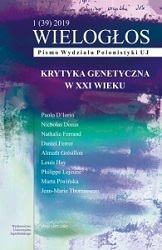
The article attempts to outline the history of French genetic research upon 18th-century manuscript collections. Contrary to the stereotypical view of the 18th century as a period when manuscripts were allegedly destroyed in order to hide evidence of the painstaking execution of the final version of a work, this epoch did leave us manuscripts, frequently full of corrections, which suggest that the Enlightenment thought and literature kept searching and experimenting. The Enlightenment philosophical and political concepts had undergone many stages before they adopted the shape we are familiar with. Thanks to the existence of their preliminary, draft versions, enlightenment novels, theatrical plays and poems provide an opportunity to observe the whole process of creation. The fascinating workshop of enlightenment drafts and subsequent versions of written works shows an area of literary and philosophical work marked by aesthetic and ideological conflicts, which shook the authors in their process of artistic creation.
More...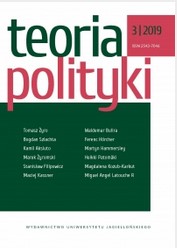
This essay deals with the post-Machiavellian phase of the history of prudence in Western political thought. After the sudden rise of Machiavellism, or the reason of state discourse, the second half of the 16th century saw an effort to turn back to a more traditional understanding of the virtue of prudence, or at least to try to combine prudence and reason of state in a way which would help to moderate its subversive power. Confronting the warlike events of their age, in their politically oriented writings the two hero of the present paper, Montaigne and Lipsius, expressed an interest in the question how a more tradition-based concept of prudence could and should find its place once again in politics. The paper is going to show how Montaigne’s prudence integrates much of Machiavelli’s insight, while Lipsius’s concept of prudence combines “reason of state” and Christian stoicism. Finally it will be argued that both thinkers represent varieties of early modern conservative prudence, or alternatively, of political realism.
More...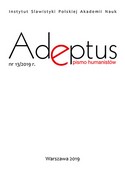
This article is devoted to the role and significance of paradoxes in the philosophical thought and mysticism of the sixteenth-century Bengali Vaishnava theologian Jīva Gosvāmī. He situates his system within the Vedānta school, where the main category distinguishing its branches and deciding on their specific character is the relation between the Absolute, the phenomenal world and the human being. In Gosvāmī’s school, this relation involves identity and distinctness (bhedābheda) of those categories at the same time, referred to by the word acintya (“inaccessible to reason”), which further stresses this ontological paradox. Although doctrinally the most important, it is not the only paradox in Gosvāmī’s thought. Adopting this core metaphysical thesis engendered many other aporias, including those concerning the nature of the soul, the concept of bhakti (loving devotion to a deity) and the idea of liberation (mukti), which Goswāmī then attempts to solve in his most important philosophical treatise – Ṣaṭsandarbha.
More...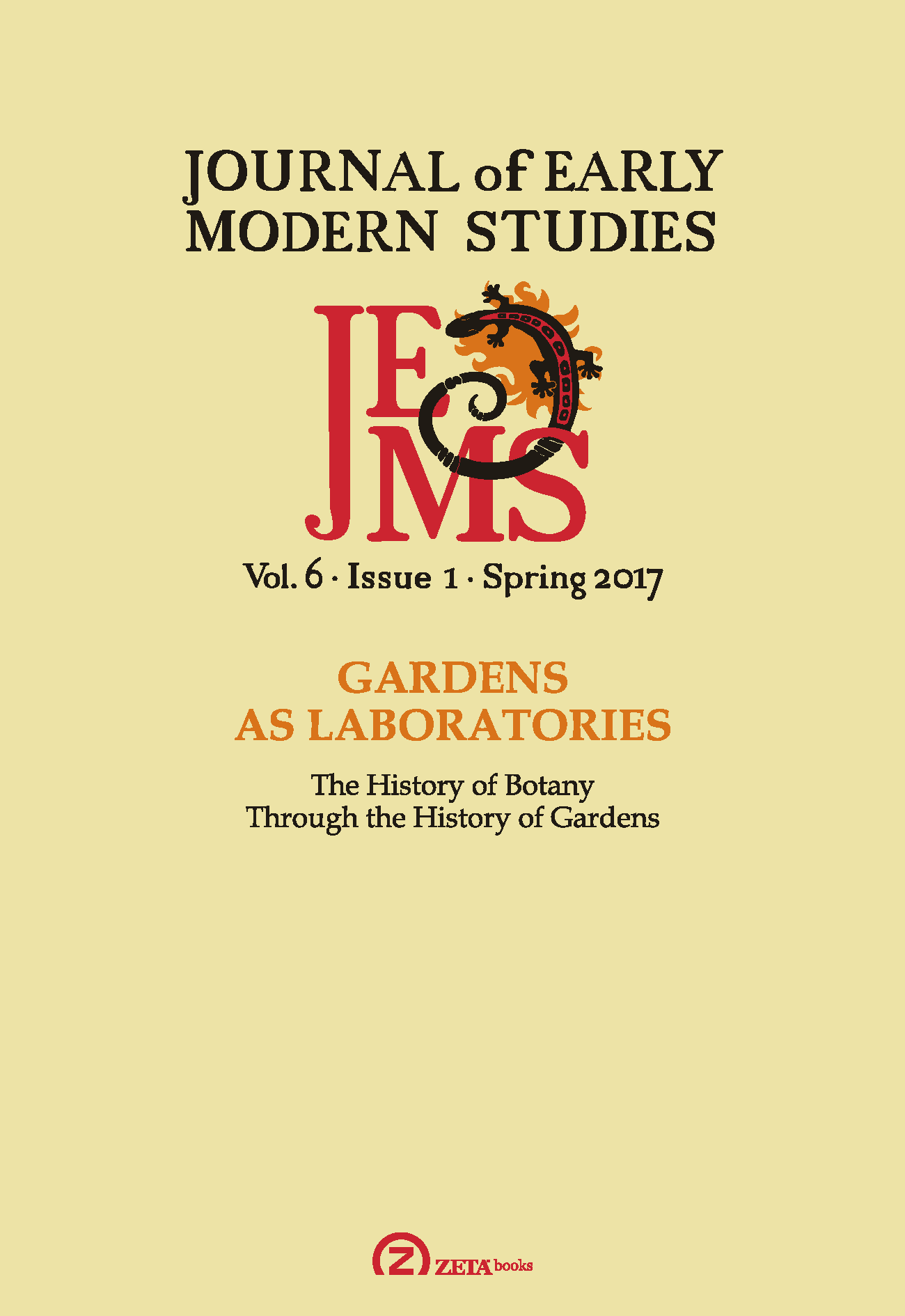
Bacon’s projects of natural history were extremely popular in the mid-seventeenth century, especially for a group of people devoted to experimental activities, namely the Hartlib Circle. Ralph Austen, one member of the Hartlib Circle, tried to construct his own project of natural history using Bacon’s Sylva sylvarum as a pattern and following the Baconian scheme with particular interest for the methodological aspects entailed by such an endeavor. This paper provides an account of Austen’s attempts at writing a natural history as found in his Observations upon some part of Sr Francis Bacon’s Naturall History. It discusses the methodology and aims served by such an enterprise, both practical and theoretical: the role of experimentation in the process of compiling a natural history as the most reliable activity able to provide accurate knowledge of the natural world and the determination to provide general rules and axioms about nature.
More...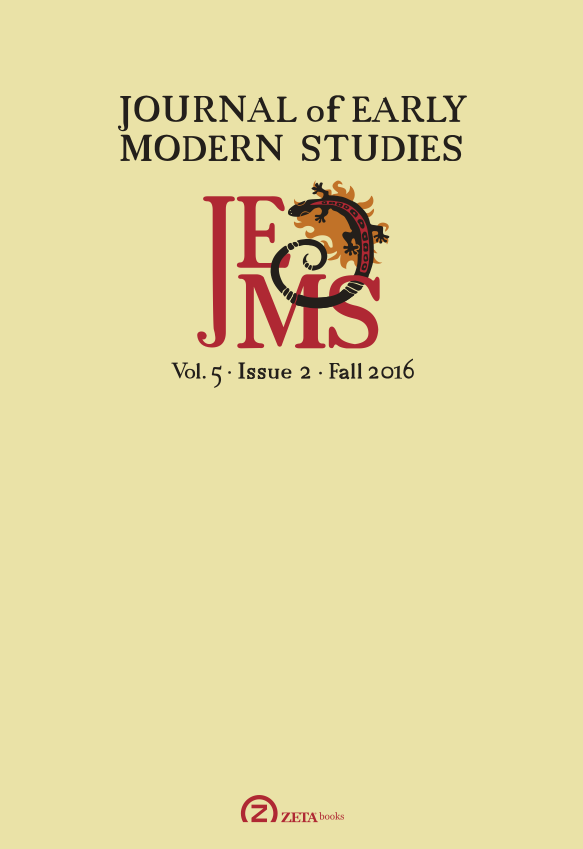
In this short essay I will aim to show that literary fiction is consistently at the vanguard of the exploration of philosophical problems relating to the concept of world, while what we think of as philosophy, in the narrower sense, typically arrives late on the scene, picking up themes that have already been explored in literary texts that are explicitly intended as exercises of the imagination. I will pursue this argument with a sustained investigation of the shared aims and methods of Miguel de Cervantes and René Descartes.
More...
Italo Calvino’s Invisible Cities presents a wide array of possible cities—cities whose composition turns on a productive ambiguity of their being described or invented by Marco Polo in his conversations with Kublai Khan. Implicit in this book is also a theory about how all possible cities are composed. The method turns on decompos¬ing a city down to its basic elements and recomposing it in different ways through the imagination. I argue that there is a close affinity between Calvino’s theory of fictional cities and Leibniz’s theory of possible worlds. The main similarity is that both theories are combinatorial—they suppose that possibilities are produced by combination and variation of basic elements. The paper presents Leibniz’s theory of possibility in its metaphysical context and explores the similarity (as well as some differences) with Calvino’s cities in their literary context. I suggest that there is a rather strong relation between the theory of literary fiction implicit in Invisible Cities and Leibniz’s theory of possibility, in that both define the possible in terms of the conceivable. Indeed, Leibniz often refers to literary examples to substantiate his position, and I argue that this reveals an essential feature of his theory.
More...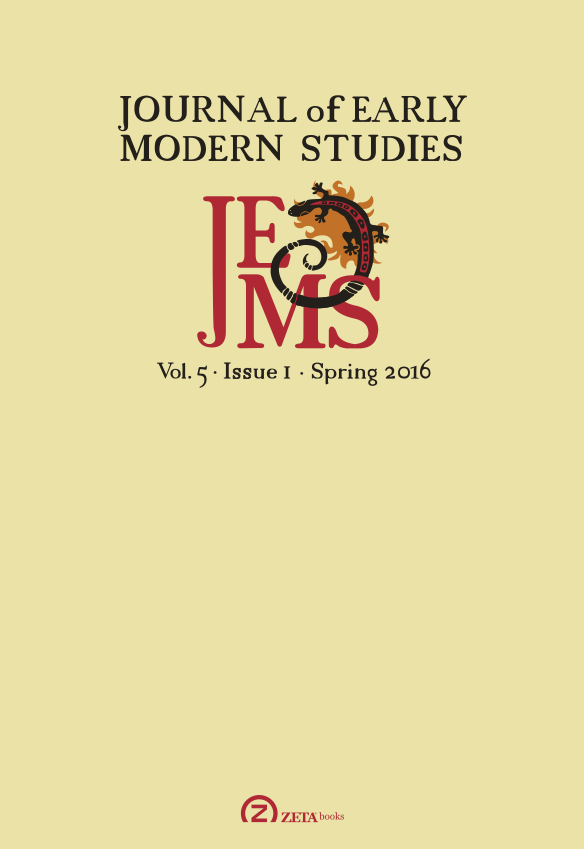
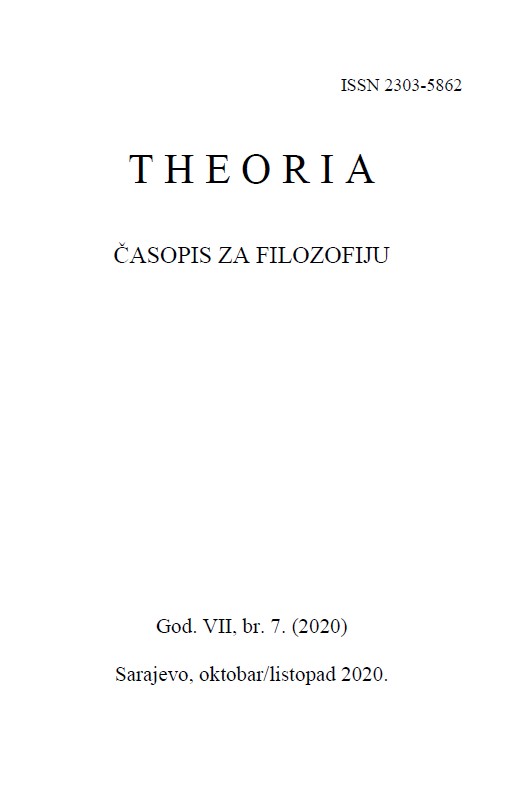
Starting from Plato's understanding of dialectics, this paper examines the nature, purpose and meaning of human practice. This examination tends to point out an importance of the relation between true knowledge and human engagement. It indicates that a neglection of dependence between practice and knowledge causes a fatal dominance of common belief and revanchism in history. The collapse of dialectics is, implicitly, re-examined as the central event of the beyond-metaphysical reality of the region. True knowledge, therefore, is understood here as the foundation of human dwelling which, through the reality of historical existence, reaches a desired peace: a good life. Finally, this point justifies philosophy as a life well lived.
More...
The paper is written in order to demonstrate the lack of soundness of the present counter-Enlightenment attacks against reason and science. The characterisation of Enlightenment cannot only refer to the logical consequences of the universally manifested reason –(the wishful thoughts about) the humans‘ education and educability and thus the changing the world for the better –without substantiating them. Kant has substantiated the Enlightenment epistemology that supports even today the human endeavour to live in a better world. As the purpose of the analysis is the epistemological way of comprehension –i.e. the rational all the way, coherent to the end, thus the scientific questioning of the premises of every theory –the paper thus features only a selection from among the coryphaei of the Enlightenment movement. It starts from Kant‘s ―Copernican revolution‖ –a metaphor used by him that may rightfully be employed in order to evaluate his philosophy –which, in the view expressed here, consists in the interdependence of the constructivist epistemology and the categorical imperative ethics. Actually, and this is the thesis promoted here, this epistemology and this ethics constitute a continuous and unique structure and just this unitary epistemological-ethical structure, called here even the Enlightenment epistemology, is the basis of the Enlightenment perspective and theory of comprehension. But this perspective and comprehension form a methodological pattern for the approach of the world and for the reason to be of the human knowledge. Thus, the paper is not a simple reminder of an old page of the history of philosophy. And neither should the history of philosophy be thought of as an evolution of ideas, where there would exist just a simple transmission and taking over of the relay from one paramount theory to another and where at one time or another the respective preponderant theory would exist alone. The Enlightenment pattern was not the only one when it appeared, and so much less today. The epistemological analysis of some contemporary facts emphasizes the contradictory views expressed within the Enlightenment and counter-Enlightenment manners. There are presented Enlightenment type arguments and anti-Enlightenment arguments, put face to face. Thus, the paper shows that the Enlightenment perspective and understanding defeat the counter-Enlightenment attacks and they outline a methodological framework for the current interpretation of science and technology.
More...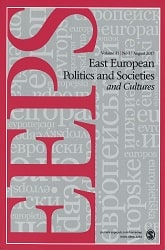
Johann Gottfried von Herder, whose life epitomized the cosmopolitan character of the intellectual elite in the greater Baltic region of his time, was born in 1744 in a small East Prussian town. A Russian army surgeon quartered in his town in 1761-62 befriended him and helped finance his way to Konigsberg where he first studied medicine, and then theology and philosophy. Immanuel Kant, from whom he later became estranged, was his influential teacher. After his studies, he became a Protestant minister and teacher in Riga, then a largely self-governing German city within the Russian Empire. Later, he travelled to France, and eventually moved to Weimar. [...]
More...
Croatian literary culture of the 18th century is marked by stylistic pluralism, considering that its Enlightenment character and its didactic (educational, moralistic and Catholic) and utilitaristic dimensions are emphasized the most. Austrian catechism was the fundamental book of school religious education from 1777 until 1847 in the whole Habsburg Monarchy, and it played an important role in the upbringing of children, but also of the entire family and social community in the spirit of Josephine politics. This topic is viewed from the perspective of Immanuel Kant who found it important to emphasise the dangers to which the fetishisation of ecclesiastical norms can lead to, i.e. to hinder the development of critical moments of liberty and upbringing. The absence of Enlightenment period in Croatian countries of the Habsburg Monarchy is complexly conditioned: from religious resistance and changes in a social and political sense to stagnancy and lack of education of a large part of the population, altogether favourable to the Croatian nobility and clergy.
More...